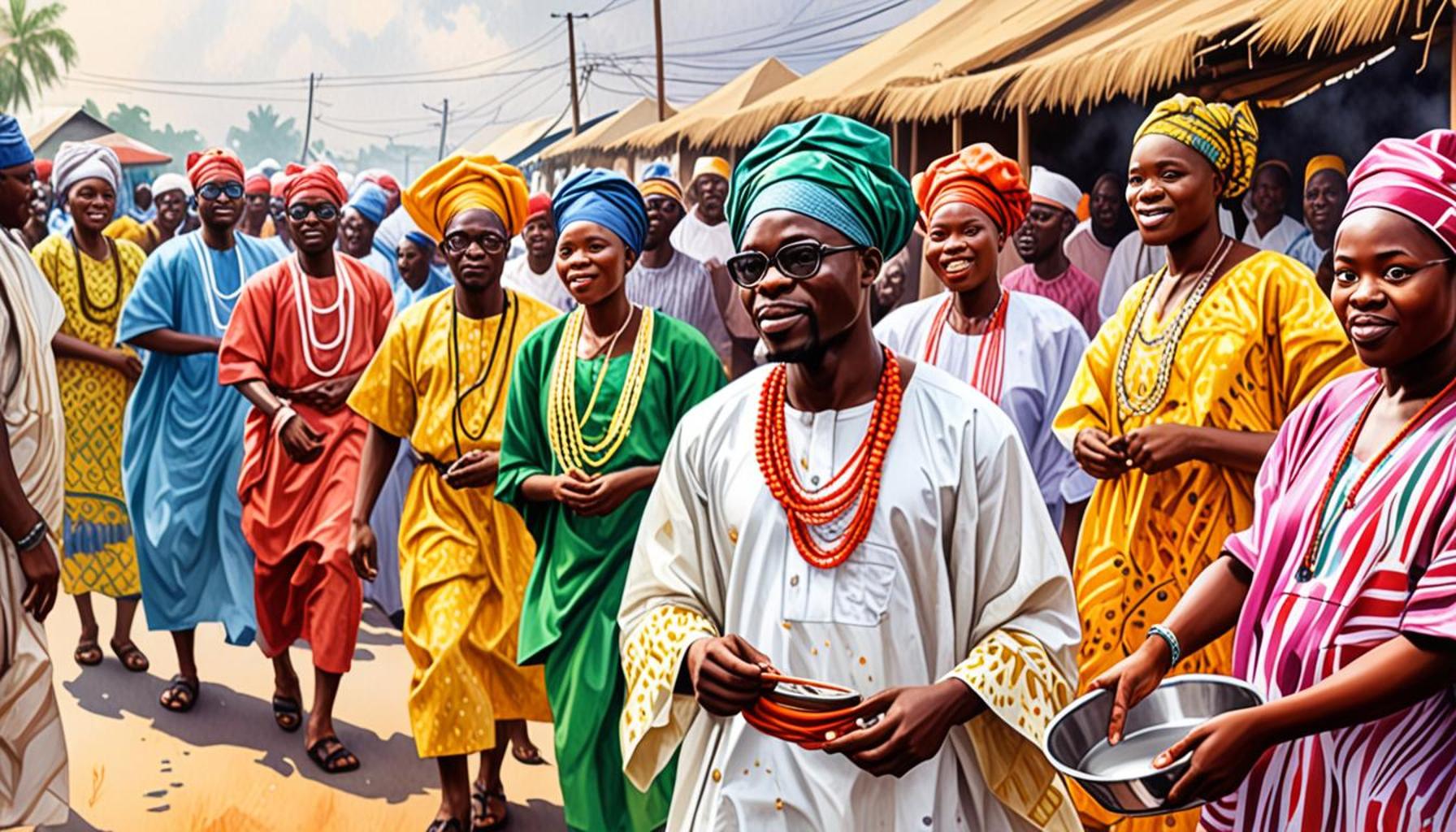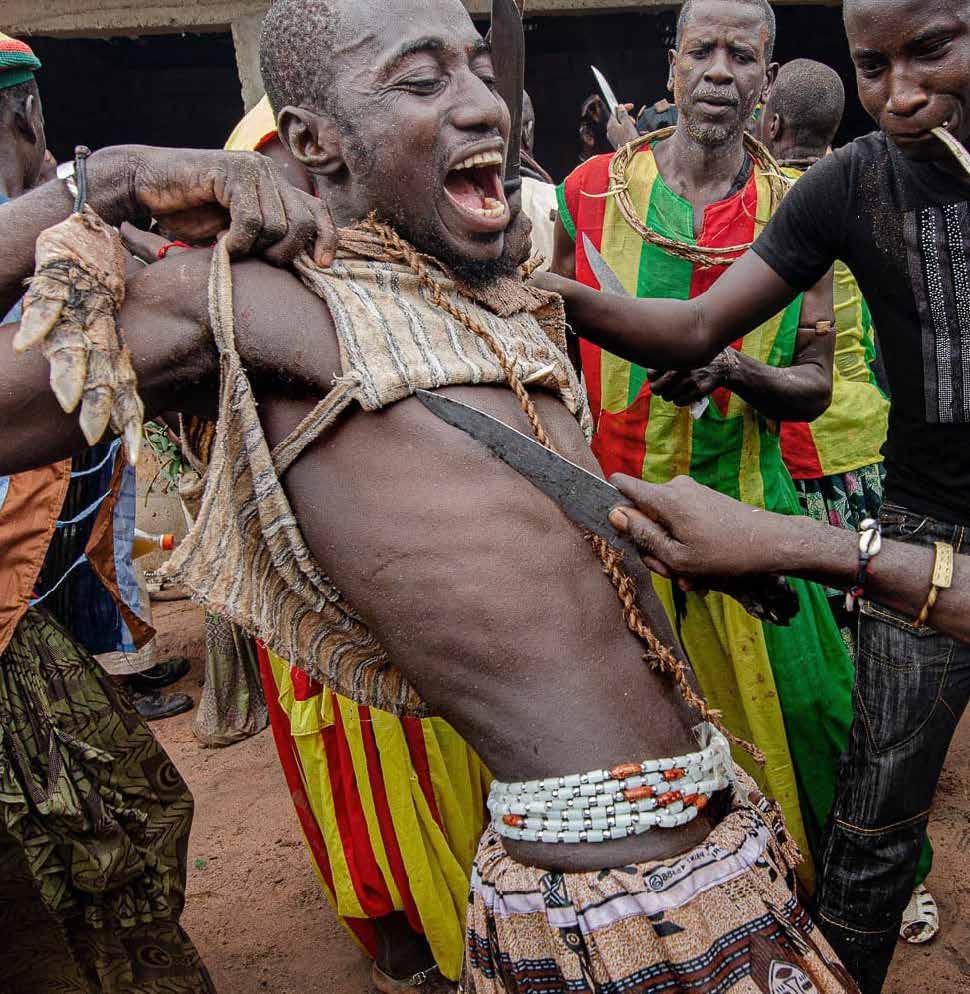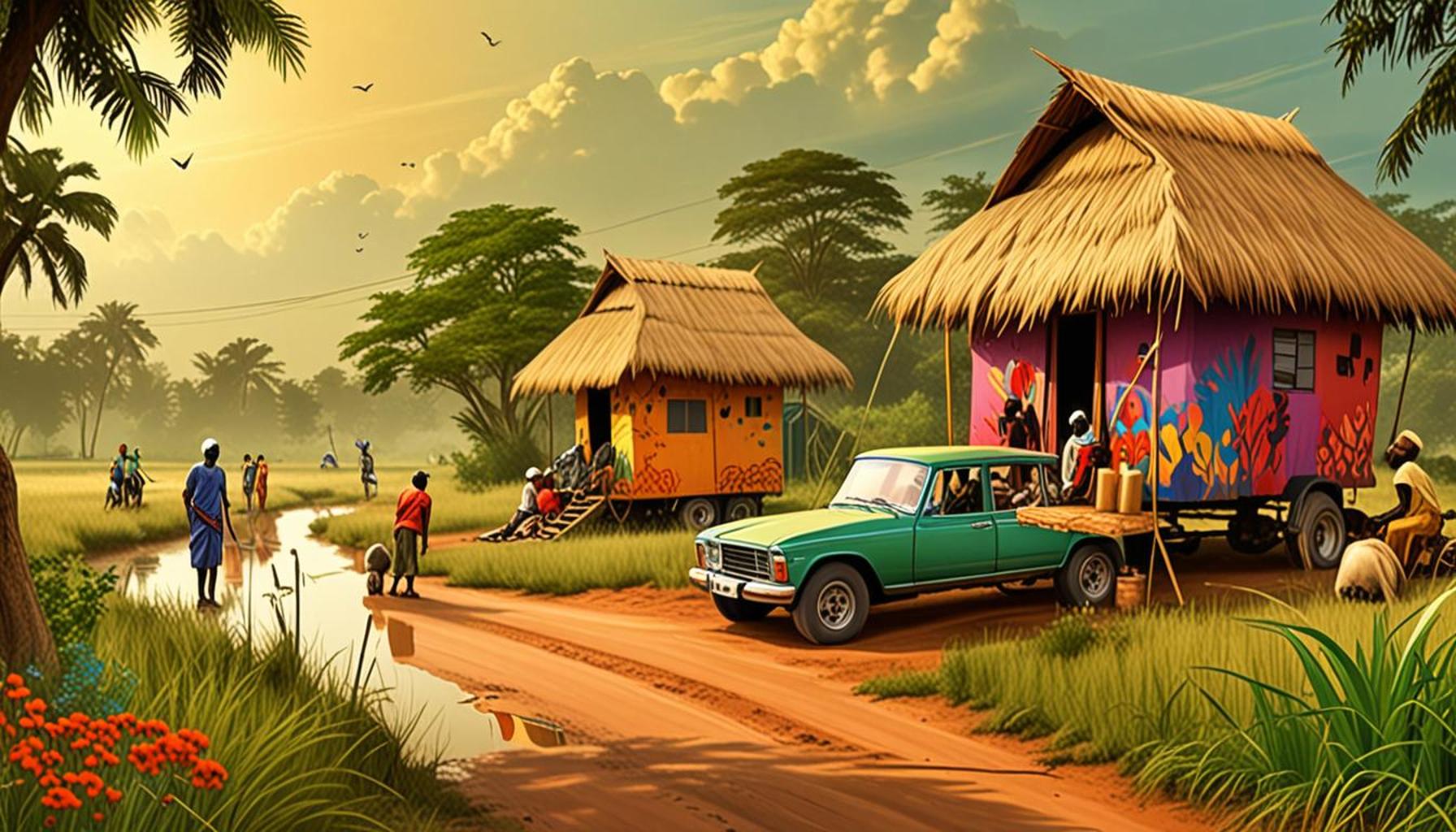Culture and Traditions: Immersive Experiences in Local Festivals of Nigeria

The Cultural Tapestry of Nigeria
Nigeria is a true melting pot of diverse cultures, each community adding a rich layer to the country’s identity. The local festivals celebrated across the nation are not just events; they are vibrant expressions of a shared heritage, showcasing the artistry, music, and history that resonate with Nigerians and intrigue visitors from around the world.
Among the most fascinating aspects of these festivals are the traditional dances. Each dance form carries its own significance, reflecting the beliefs and narratives of the people. For instance, the Ekombi dance of the Efik people, performed on the shores of Calabar, with its swift footwork and rhythmic movements, invokes a celebration of life and community. On the other hand, the colorful masquerade performances from the Yoruba culture serve as a bridge between the living and the ancestors, inviting spectators to witness the spiritual stories of their heritage.
Another striking feature of Nigerian festivals is the vibrant costumes. Participants adorn themselves in intricate traditional outfits that scream both color and craftsmanship. For example, at the annual Calabar Carnival, you’ll witness elaborate costumes that blend African motifs with contemporary designs. These costumes are not merely for spectacle; they honor the creativity of local artisans and symbolize the pride of their respective communities.
No festival is complete without indulging in local cuisine. The rich flavors and aromas that waft through the air are as much a part of the celebrations as the music and dance. Dishes such as Jollof rice, often called the “party rice,” and Pounded yam served with flavorful soups, take center stage during festivities, inviting attendees to explore the depths of Nigeria’s culinary traditions. Festivities like the Osun-Osogbo Festival also feature traditional meals that reflect the agricultural bounty of the region, fostering a sense of connection to the land.
Every festival, whether local or national, unites thousands of people, fostering a spirit of camaraderie and cultural appreciation. As we delve into the essence of these celebrations, we uncover their relevance in preserving Nigeria’s heritage and identity. The stories told through dance, the artistry of costumes, and the flavors of traditional dishes comprise a rich narrative that deserves exploration and celebration, ensuring that Nigeria’s cultural tapestry remains vibrant for generations to come.

SEE ALSO: Click here to read another article
Immersive Cultural Experiences Through Music and Dance
The pulsating rhythms of Nigeria’s musical landscape play an essential role in the immersive experiences offered by local festivals. Music is not merely an accompaniment to dance; it is a vital component of storytelling and cultural expression. Festivals such as the Fela Durotoye Music Festival celebrate the legacies of iconic Nigerian musicians, immersing attendees in the sounds of Afrobeat, highlife, and traditional folk music. Afrobeat, a genre birthed by Fela Kuti, blends jazz, funk, and West African rhythms, serving as both an artistic expression and a platform for social commentary. Such soundscapes evoke profound emotions and reminiscences of the rich narratives embedded in the country’s history, highlighting struggles, aspirations, and the everyday experiences of the Nigerian people. These festivals not only entertain but also offer a space for collective memory and reflection.
One cannot overlook the significance of cultural drums, which are central to many of Nigeria’s festive gatherings. From the prominent talking drums of the Yoruba, which can mimic speech and convey messages, to the vibrant udu drums of the Igbo, each instrument provides a unique voice that communicates tradition and spirituality. Drumming sessions at festivals become lively congregations where people unite, their hearts synchronizing with the beat, transcending barriers of language and age. For instance, during the Osun Osogbo Festival, the rhythmic beats of drums draw participants and observers into a communal dance that celebrates the goddess Osun, creating a profound connection to heritage.
Cultural Significance of Traditional Games
While music and dance often steal the spotlight, traditional games featured at local festivals also play an important role in preserving cultural heritage. These games, often enjoyed by both young and old, foster a sense of community and friendly competition. Abula, is a traditional wrestling match where strength and skill are put to the test, showcasing resolve and endurance. Ayo, a strategy board game similar to checkers, invites players to engage in critical thinking and cultural camaraderie, often accompanied by lively banter and laughter. Traditional Relay Races, featuring indigenous techniques and often incorporating cultural items, showcase teamwork and agility, making them a crowd favorite.
These traditional games promote bonding and keep age-old customs alive, reminding participants of the communal practices that once defined their ancestors. Engaging in these activities not only provides entertainment but also serves as a gateway for cultural education. Younger generations learn the rules, storytelling, and traditional knowledge associated with each game, grounding them in their identity and heritage.
Nigeria’s local festivals invite all who attend to experience a deep connection with their roots through music, dance, and games. They affirm individual and communal identities, securing a space where history and cultural pride are preserved. In a rapidly changing world, these festivals become not only celebrations but also platforms for cultural continuity, helping to weave a stronger societal fabric that honors the stories and legacies of Nigeria’s diverse people. As attendees participate in the rhythm of the music and the thrill of the games, they engage in a vibrant tapestry of culture that reflects not just the past, but also the hopes and aspirations for the future.
| Advantage | Description |
|---|---|
| Rich Cultural Heritage | Nigeria’s festivals showcase the diverse cultural traditions of its ethnic groups, offering visitors a chance to experience various art forms, music, and dance. |
| Community Engagement | Festivals foster a sense of belonging and participation, as locals and tourists come together to celebrate, enhancing cross-cultural understanding and social cohesion. |
| Economic Boost | These gatherings attract tourism, providing a significant economic boost to local communities through hospitality and services related to the events. |
| Historical Significance | Festivals often commemorate historical events or figures, offering deep insights into the history and narratives that shape Nigerian society today. |
The local festivals in Nigeria are not just mere celebrations; they are a tapestry woven with vibrant threads of the country’s culture and traditions. Each festival presents a unique narrative, reflecting the values, beliefs, and practices of its people, creating an immersive experience for attendees. Whether it’s the energetic beats of traditional drums echoing through the air or the colorful attire worn by attendees, these events provide a sense of unity and identity.Participating in such festivals deepens understanding and appreciation of Nigeria’s rich cultural mosaic. Visitors gain the opportunity to partake in rituals and activities, including food tasting, traditional dances, and the arts. This cultural immersion fosters connections, broadening perspectives, and creating lasting memories that surpass mere observation.In essence, festivals in Nigeria represent an intersection of past and present, a celebration of resilience and joy, inviting everyone to experience the heart and soul of the nation in a truly engaging manner.
ADDITIONAL INSIGHTS: Expand your understanding here
Oral Traditions and Storytelling Festivals in Nigeria
Another significant aspect of Nigeria’s cultural festivals is the emphasis on oral traditions and storytelling, which play a pivotal role in preserving history and cultural values. Festivals like the Calabar Carnival and the Ogun Festival not only celebrate communal identity but also serve as a stage for the oral narrators, or griots, to share tales that convey moral lessons, historical events, and cultural folklore. These storytellers, often adorned in colorful traditional attire, captivate audiences with their dynamic performances that incorporate elements of drama, music, and dance, engaging spectators and educating them about their heritage.
The rich tapestry of Nigeria’s oral literature reflects a myriad of themes, from the creation myths of the Yoruba to the heroic deeds of warriors in the North. By participating in festivals that showcase storytelling, attendees immerse themselves in the enchanting world of the past, connecting generations through shared narratives. For instance, during the Argungu Festival, which celebrates the annual fishing competition in Kebbi State, attendees experience not only the thrill of the contest but also the storytelling sessions that delve into the legends behind the festival, illustrating both the significance of fishing and the community’s relationship with the river.
Culinary Delights: A Tasting Tour of Nigerian Cuisine
No festival in Nigeria is complete without a celebration of food, which stands as a delicious reflection of the country’s cultural diversity. The Jollof Festival, which has gained immense popularity in recent years, paves the way for culinary enthusiasts to explore the intricacies of Nigerian cuisine. Through a vibrant showcase of different Jollof rice recipes, festival-goers can indulge in a taste-testing journey that delineates regional variations—from the renowned tomato-based Jollof rice of Lagos to the spicier versions of the north.
Traditional feast days at various festivals offer even more than tasting delicious dishes. They become opportunities for cultural learning. At festivals such as the Food for All Festival, cooking demonstrations highlight indigenous ingredients and age-old methods, offering insights into the history and significance of particular meals. Participants can gather knowledge about the importance of dishes like egusi soup or pounded yam, typically enjoyed during communal gatherings, reinforcing the connections between cuisine, culture, and community. Through culinary participation, attendees forge personal bonds and create shared experiences around the dinner table, reinforcing social structures and identity.
Artisanal Crafts and Cultural Displays
Finally, local festivals present an unparalleled opportunity for artisans to showcase their skills, offering a sensory immersion into Nigeria’s visual and decorative arts. Handcrafted goods, such as intricate beadwork, woven fabrics, and carved wood items, reflect the rich artistry embedded in Nigerian culture. Festivals like the National Arts and Crafts Expo gather talented craftspersons from every corner of the nation, creating a vibrant marketplace where attendees can purchase unique pieces while also engaging with the stories of the artisans behind them.
These cultural displays promote economic empowerment and revive interest in traditional crafts among younger generations. By witnessing live demonstrations of skills, such as pottery-making or tie-dye, participants are encouraged to explore their own creativity and consider the cultural significance of preserving these age-old practices. Events like the Made in Nigeria Festival aim to instill pride in local craftsmanship and reflect the nation’s economic potential through culture.
Through music, dance, storytelling, cuisine, and artisanal crafts, Nigeria’s local festivals create immersive cultural experiences that are profoundly enriching. They not only celebrate the vibrant tapestry of Nigeria’s past but serve as dynamic platforms that engage the present and inspire futures rooted in tradition.
SEE ALSO: Click here to read another article
Conclusion: Embracing the Richness of Nigeria’s Cultural Festivals
In conclusion, the immersive experiences offered by local festivals in Nigeria are a vibrant celebration of the nation’s rich culture and traditions. Through the dynamic interplay of music, dance, storytelling, culinary arts, and artisanal crafts, these festivals serve as powerful platforms that bridge the past and present, fostering a sense of community and shared identity among attendees. Festivals such as the Calabar Carnival, Argungu Festival, and National Arts and Crafts Expo exemplify this cultural dynamism, inviting locals and visitors alike to partake in the rich narratives that define Nigeria’s heritage.
Moreover, these celebrations extend beyond mere festivities; they are educational experiences that enrich participants with knowledge about indigenous practices, historical significance, and the artistry behind traditional crafts. As the world increasingly seeks authentic connections, Nigeria’s local festivals present an enticing opportunity for cultural immersion, promoting not just tourism but also economic growth through the empowerment of local artisans and cuisine specialists.
Ultimately, engaging in these cultural celebrations can inspire individuals to explore their roots, reunite with their communities, and savor the flavors of life in a diverse society. By embracing and promoting Nigeria’s cultural festivals, we ensure that future generations inherit a rich tapestry of traditions that continue to thrive in a modern context, reminding us all of the beauty found in our shared heritage.


